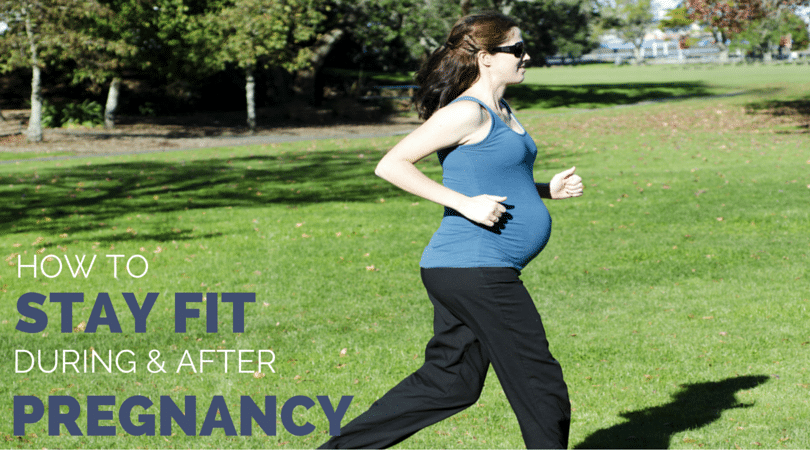This guest post was written by Runtastic
The days where training during pregnancy was considered dangerous thankfully belongs to the past.
Physical activity during pregnancy is not only allowed, but actually encouraged. Of course, provided that you as an expectant mother are healthy, feel good, and have your doctor’s permission.
Do you know the recommended guidelines of running for expectant mothers? If so, are you sure exactly how much to do, and what you need to consider before heading out on the roads?
It’s okay if your answer is “I don’t know.” That is what we are here for!
We wanted to know more about why running during pregnancy is good, and so we researched it for you. In this post, we’ll share what we’ve found, and how to make sure you do not put your baby at risk, and we will finish up with how you can get back to running after birth in a safe and timely manner.
Now:
Recent scientific studies have shown that regular exercise is not only good for the expectant mother, but the child, too. Researchers found that babies born to mothers who were physically active three times a week during pregnancy had a steadier heart rate during as well as after pregnancy.
For the purposes of comparison, pregnant women who exercised little or not at all during pregnancy were used as the control group.
Before we begin with the exercise itself, let’s dive deeper into one of the biggest talking points about fit and active women during their pregnancy; weight gain.
How much weight should you gain during pregnancy?
The amount of weight you can gain in each trimester differs with each person.
1st Trimester
In the first trimester, most women gain very little, if any, weight.
In fact, some women even lose weight because they struggle with morning sickness (nausea and vomiting). Any large weight gains in early pregnancy are probably due to eating habits.
2nd Trimester
In the second trimester, the child goes through a major growth spurt and the mother puts on weight accordingly. Women of normal weight usually gain about 1/4-1/2 kg (½ to 1.1 lb) per week during this stage.
3rd Trimester
In the last trimester, mothers gain about 1/2 kg (1.1 lb) per week. The total weight gain in the last three months is on average 4-6 kg (9-13 lb).
What’s the bottom line?
In general, it should be noted that weight gain during pregnancy is very individual. It depends largely on your pre-pregnancy weight, and should always be checked by your doctor.
Based on your Body Mass Index (BMI) before pregnancy, you can use the following ranges as a rough guide to determine whether your weight gain is “normal” and healthy.
If you start pregnancy underweight (BMI < 18.5):
Gaining 7 – 18.2 kg (28-40 lb) during your pregnancy is safe
If you start pregnancy at a normal weight (BMI between 18.5 and 24.9):
Gaining 4 – 15.9 kg (25-25 lb) during your pregnancy is safe
If you start pregnancy overweight (BMI between 25 and 29.9):
Gaining 8 – 11.4 kg (15-25 lb) during your pregnancy is safe
If you start your pregnancy heavily overweight or obese (BMI above 30):
You should gain no more than 9 kg (20 lb) maximum during the pregnancy
Why Should Expectant Mothers Exercise During Pregnancy?
- Eases common pregnancy-related problems like backache, posture issues, and constipation
- Increases the supply of oxygen to you and your child
- Helps your body prepare for the strain of giving birth
- Allows quicker and easier return to pre-pregnancy weight and figure
- Strengthens your cardiovascular system, making you feel fitter and more resilient
- Prevents stretch marks, thromboses, and varicose veins
- Improves the quality of your sleep.
- Enhances your general sense of well-being and helps against mood swings and stress. We talked about this more in our podcast with Black Girls RUN! It is good for everyone to carve some time out for themselves!
- Reduces your risk of gestational diabetes
Exercise also has a positive effect on your weight during pregnancy.
Some expectant mothers see pregnancy as a chance to finally be allowed to eat whatever they want because they are now eating for two. But this is only partially true: Being either underweight or overweight can cause damage to you and your child.
Pregnant women who are heavily overweight or obese have a higher risk of diabetes and high blood pressure. On the other hand, a starvation diet can lead to an underdeveloped child and increase the risk of premature birth.
What Training Should I Do During Pregnancy?
Regular exercise during pregnancy thus offers numerous benefits for you and your child.
For the most part, during a trouble-free and normal pregnancy, you can do anything you want, as long as you feel good and do not put you and your child at risk.
However, there are a few rules for training during pregnancy
- Get permission from your gynecologist before starting with any training
- Avoid sports with a high risk of injury or falling (skiing, climbing, horseback riding, martial arts, diving, surfing, etc.)
- Avoid contact sports like soccer, handball, and basketball
- Do not lift heavy weights
- Do not participate in competitive sports and races, especially if you are a runner who is unable to hold back!
- Avoid mountaineering in high altitudes (> 2500 m/8,200 ft)
And the most important tip of all:
Stop training if you experience dizziness, nausea, pain, or any other discomfort
How to train safely during pregnancy
If you were a committed runner before pregnancy, you will be able to continue to run throughout as long as you listen to your body and cut yourself some slack.
If you do not feel like running, don’t do it!
However, there is one aspect of running while pregnant that does need to be changed: training intensity.
Doctors and midwives recommend moderate exercise.This means you can push yourself, but you should never reach the point of exhaustion. If you can easily maintain a conversation with someone while exercising, this is a good sign that you are training at moderate intensity.
Sound Familiar:
Our research found that runners should use this tactic for 80% of runs to make sure you keep your easy pace slow enough, which led to runners being 23% faster when it matters!.
As a rule of thumb, pregnant runners should not exceed 70% of maximum heart rate for your age (220 minus your age).
This is easy to calculate:
For a 30-year-old woman:
The maximum heart rate for her age (220 minus 30) is 190 beats per minute.
Multiplying this number by .7 for 70% of maximum heart rate, gives a training intensity of 133 beats a minute.
Therefore, this expectant mother should keep heart rate at or below 133. Although there are some important caveats to heart rate training that runners need to keep in mind as they can affect the number you see.
Many pregnant women develop a heightened awareness of their body during pregnancy and can tell quite clearly what activities they can and cannot do.
You should feel comfortable and enjoy exercising at all times.
What types of exercise are good for pregnant runners?
Running
Bet you never thought we would recommend that one?
Running at a comfortable and easy pace during pregnancy is a good way to stay in shape.
Remember:
Make sure you do not exceed moderate intensity and that you feel comfortable at all times. Runners should wear a well-cushioned running shoe because of the extra weight and therefore impact on the body.
Hiking or Nordic walking
Hiking and Nordic walking are a great opportunity for women who were not so active before their pregnancy to get some exercise and fresh air.
Hiking is twice as much fun with a partner or a group of friends.
Cycling
Cycling at a comfortable pace in the fresh air stimulates your circulation, improves the blood flow in your legs and reduces the risk of thrombosis.
Because of the risk of falling, you should switch to a stationary bicycle starting in the 20th week of pregnancy.
Swimming
Water aerobics and swimming are a varied and fun way to keep fit during pregnancy.
Plus, the buoyancy of the water lessens the stress on your joints and muscles, which means you can work on your endurance in a low-impact and gentle manner.
Yoga and Pilates
Because of the loosening of joints and ligaments in the pelvic area, certain yoga and Pilates poses are not suitable during pregnancy.
However, there are special courses for pregnant women, which offer you a good opportunity to relax and prepare to give birth.
RunnersConnect Bonus
Download your FREE breathing guide for Runners.
It’s a PDF with images and descriptions of the most effective pilates exercises to strengthen your body while relaxing your mind. The perfect time to visualize and go through those barriers.
How to Return to Running After Pregnancy
Pregnancy and childbirth put a lot of strain on your body. That is why it is important that you give yourself at least 6-8 weeks of rest after delivery.
Before you start training again regularly, it is important to regain stability in your pelvic area. You can strengthen your pelvic area with special postnatal exercises.
Runners who start training too soon run the risk of stretching their pelvic floor, which often results in incontinence.
As soon as you have your gynecologist’s permission, you can begin with light endurance training.
The intensity should be such that you always feel comfortable and your workout should not put too much strain on your body.
A short walk is a perfect way to slowly get your body used to regular exercise again. If you feel good, you can also do a light workout on a stationary bicycle. The low-impact activity is easy on your pelvic floor and lets you keep your child close to you while you work out.
Your first few runs should be very short and low intensity. As soon as you start to feel good in general, you can increase the intensity of your workouts.
Get all the facts on pre, during and post-natal fitness & training. Keep these facts in mind when working with your doctor on a fit and healthy pregnancy. If you are looking for further research backed information for your pregnancy, you can read more about how to excel when you are expecting.
Are you expecting a baby soon? We wish you a happy and healthy pregnancy!
![]() Whether you’re looking to shed a few pounds, squeeze some exercise into your day or improve the quality of your sleep, you’re sure to find plenty of tips and tricks on the Runtastic blog! Runtastic’s content team is a high-powered mix of dietitians, certified personal trainers, running coaches and former professional athletes, all ready & eager to help boost your motivation and enhance your performance.
Whether you’re looking to shed a few pounds, squeeze some exercise into your day or improve the quality of your sleep, you’re sure to find plenty of tips and tricks on the Runtastic blog! Runtastic’s content team is a high-powered mix of dietitians, certified personal trainers, running coaches and former professional athletes, all ready & eager to help boost your motivation and enhance your performance.
Runtastic is a content partner of Runners Connect.








